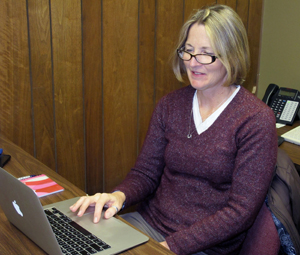By Eileen Mozinski Schmidt

Kent Ferris is encouraged by what he sees happening in local volunteerism.
“There’s a whole lot of good going on and a whole lot of volunteers,” he said. Ferris, director of Social Action and Catholic Charities for the Diocese of Davenport, added that a legacy of volunteering exists among Iowans.
“It’s a combination of incredibly powerful politicians, priests and religious Sisters and everyone else being aware of the responsibility to watch out for your neighbor,” he said.
Volunteerism has been increasing nationwide, with the number of volunteers rising to 64.3 million in 2011, up 1.5 million from the year before, according to the Corporation for National and Community Service.
The organization, which bills itself as a federal agency that invests in thousands of faith-based and nonprofit groups like AmeriCorps, reported that the 2011 volunteer rate was the highest seen in five years.
Iowa had the third highest volunteer rate in the nation in 2011; the state’s residential volunteer rate of 38.4 percent was surpassed only by Idaho and Utah, the corporation reported.
Volunteer Amy Kersten of Holy Family Parish in Davenport said that she sees more volunteers in her midst as more organizations foster a culture of volunteerism.
“Especially exciting to me are the youths and young adults I know who already volunteer their time,” said Kersten, 50, who volunteers at her parish and for the Davenport Diocese’s Social Action Office and Project Renewal in Davenport. “I think that bodes well for the future of our community.”
Even as the ranks of volunteers remain strong, some local leaders say more recruitment is necessary.
Certain parish needs are greater than others, and some say more can be done to connect local volunteers and better define their missions.
St. Anthony Parish in Davenport, for example, has a strong and committed group of volunteers. But it can be challenging to find younger volunteers in a parish population that skews older, said Sister Judy Herold, SSND, pastoral associate and director of religious education.
Ferris sees a challenge in encouraging those already volunteering to tell the wider community about what they are doing.
“Modesty gets in the way of explaining a good thing to the greater community,” he said, adding that in his experience many Iowans, particularly Catholics, tend to be “modest, self-effacing folks.”
He hopes more communication about local volunteer efforts will lead to a stronger network of volunteers across the diocese’s 22 counties.
“The challenge for our office and the diocese is to be in contact with the local parishes to know what their needs are,” Ferris said.
At parishes where more volunteers are needed, conducting one-on-one interviews would be helpful, along with distributing time and talent surveys. While the interview process can be tedious, Ferris said it is the best way to truly identify people’s gifts for ministry.
“We’ve got to do a good job of knowing what people are passionate about,” Ferris said. “We have to begin with ourselves and know who’s sitting next to you in the pew.”
Sr. Herold agreed. She added that it is up to parish leadership to follow through on those contacts and offer training in various ministries. “It’s really about building relationships, not being afraid to reach out,” she said.
To Sal Alaniz, 64, of St. James Parish, Washington, the work ahead for Catholic volunteers involves creating a more purposefully defined ministry.
“It’s not so much a matter of tasks,” said Alaniz, who encourages vision and action planning among volunteers. “There’s nothing wrong with what we do today, but there’s so much more work to be done.”
He works for and volunteers at a host of organizations locally and statewide and previously volunteered at St. Alphonsus Parish in Mount Pleasant where he was a member before moving. Alaniz is currently serving as chair of the state’s Latino Affairs Commission.
Despite challenges in honing resources and streamlining missions, Alaniz and other volunteers say the rewards of their work remain immense.
In a survey of 5,000 former Catholic Volunteer Network volunteers released last fall, 98 percent said their volunteer service made them a better person. And 95 percent said they would recommend their volunteer program to others, according to the report, published on the organization’s website.
All of these efforts, Alaniz said, build upon the template provided by Jesus’ first disciples and Paul.
“This is what we’re called to do,” Alaniz continued. “The Holy Father is calling us to this ministry.
“Let’s do it together.”







